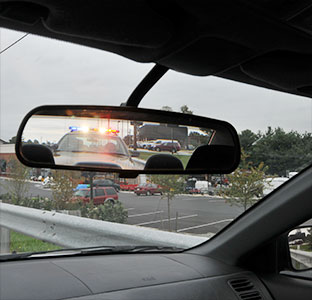Police officers’ actions are generally subject to a myriad of mandatory policies, protocols, and laws. But there is one aspect of the job that gives officers a lot of discretionary flexibility: routine traffic stops.
Rob Tillyer, associate professor in the Department of Criminal Justice and College of Public Policy at UTSA, studies the decision-making processes of criminal justice professionals, including police officers, and the use of officer discretion within traffic stops, in particular.
Traffic stops are the most common type of police-citizen interaction. Tillyer and his colleague, Charles F. Klahm IV, assistant professor of criminal justice at Wayne State University, pored over a year’s worth of traffic stop data and reports from a large, urban and majority Hispanic city in Texas.
The researchers compared stops that ended in a discretionary search of the vehicle or citizen to those that did not end in a discretionary search to determine similarities and correlations. In the course of their research, they examined 187,412 traffic stops initiated by police officers in a city of roughly 1.5 million residents served by a police force of approximately 2,000 sworn officers.
“Police officers have a lot of discretionary freedom during traffic stops, for better or worse,” said Tillyer. “Depending on legal justification and department protocols, they can let a driver leave with a ticket or a warning, ask to search a vehicle, or, if given probable cause, legally search the vehicle regardless of driver permission. They can also arrest the driver.”
While mandatory policies (i.e., department regulations that limit officer discretion) may vary slightly between jurisdictions, traffic stops generally afford police officers the freedom to enforce the law however they deem necessary within the confines of the law.
The researchers found that officers were more likely to search a vehicle for discretionary reasons in situations where more than one passenger of any demographic was present.
“There are several possible reasons why police officers may feel the need to search vehicles with passengers more often,” Tillyer said. “For one, officer safety is a paramount consideration within these situations. Alternatively, it could be an issue of officers asserting authority among a group, and it isn’t uncommon for delinquency or criminal offending to occur in a group-related setting.”
With regard to the latter explanation, the “Group Hazard Hypothesis” is a line of research in criminal justice circles dating back to the 1920s that suggests that criminal behavior often involves multiple offenders. In a 1971 study, researchers found that 65 percent of juvenile violations involved two or more participants.
In light of this, Tillyer suggests it is plausible that officers might possess heightened suspicion when engaged in a traffic stop involving multiple occupants.
Tillyer and Klahm hope this study will add to the discussion about the importance of considering external variables in research concerning police discretion and the importance of accura te reporting by police departments and citizens.
“Discretionary Searches, the Impact of Passengers, and the Implications for Police-Minority Encounters” is forthcoming in the Criminal Justice Review.

